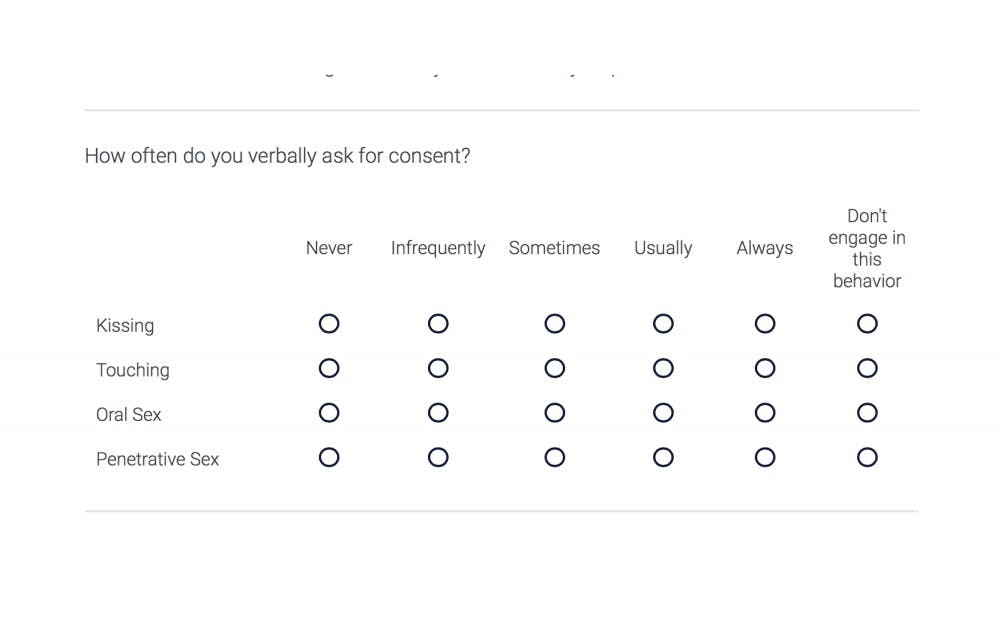Results from Duke Student Government’s ongoing sexual misconduct survey will be released at the earliest by the end of March.
The survey has been circulating since early February, for example on email blasts sent out by DSG President Tara Bansal, a senior. It collects data on perceptions of consent and the prevalence of verbal consent among students. She wrote in an email that the results could be released at the end of March.
Several members of DSG took part in designing the survey, Bansal wrote. This included junior Jacqueline Monetta, a former senator for equity and outreach, and sophomore Eric Ramoutar, current policy advisor to the DSG president.
“We’ve been planning to put out a survey for a few months and we're shaping it based on a series of focus groups we did with students,” Bansal wrote. “We sent it for edits and comments to all 13 groups on campus that work on sexual misconduct policy. All of these groups were also allowed to add questions to the survey.”
Bansal explained that the survey places emphasis on students' perceptions of consent because ambiguous interpretations of consent can still be a problem. This is still the case despite various programs such as True Blue and "Prevent. Act. Challenge. Teach." training, she noted.
The newly-released Duke University Student Experiences Survey found that 40 percent of female undergraduates and 10 percent of male undergraduates had reported being sexually assaulted at the University.
Part of the DSG survey involves getting input on whether the misconduct policy needs revision. The current student sexual misconduct policy defines consent as an "affirmative decision to engage in mutually acceptable sexual activity freely given by clear actions or words."
It adds that nonverbal communication, however, can lead to confusion and that silence or lack of resistance does not imply consent. If no clear verbal or nonverbal consent is given, then the conduct is "without consent."
But the survey asks students to imagine if the University had a "verbal-required" consent policy, in which explicit verbal consent must be given prior to sexual interactions. It then asks whether that would change student behavior.
There are no preconceived intentions to translate the results to particular policies at this juncture, Bansal explained. Instead, the survey was designed to "research various policies" on sexual misconduct.
“We have no plans to push for any specific program or policy until we fully analyze and discuss the full survey results with relevant administrators and do further focus groups,” she wrote.
Senior Jessica Van Meir, founder of We Are Here Duke and Duke Students Against Gender Violence, voiced her reservations about a verbal consent-only policy.
“Some people, myself included, were worried that if the policy does not reflect how people actually have sex, then people will not take the policy seriously. They'll think it's unrealistic or too strict, and that will undermine how seriously students take efforts to combat sexual assault and diminish the seriousness of sexual assault,” Van Meir said. “This policy change also won't necessarily make it easier to find responsibility in sexual misconduct cases, as perpetrators can just lie and say that the victim gave verbal consent.”
Instead, Van Meir—who is also a senator for equity and outreach—suggested that efforts to reduce the prevalence of sexual assault could place more emphasis on preventative efforts as opposed to policy amendments which "only address sexual assault after it occurs."
“Every Duke student needs to step up and commit to intervening when they see something happening,” Van Meir wrote. “If you're not sure if there's a problem, it's better to intervene and be wrong than to not intervene and let a sexual assault occur.”
Get The Chronicle straight to your inbox
Signup for our weekly newsletter. Cancel at any time.

